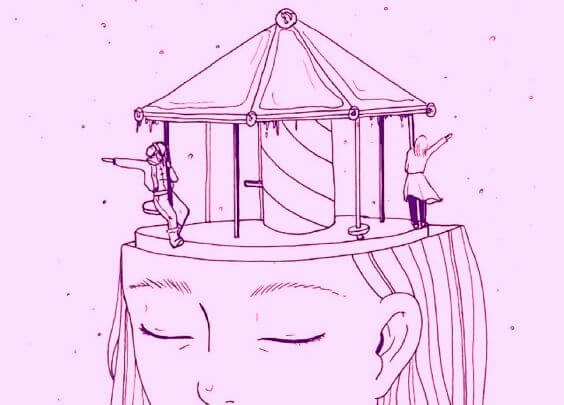Your Mind Needs to Rest Too

It’s impossible to live under constant stress and always be in a rush, because neither the body nor the mind can withstand such a high level of activation for very long. Doing so expends too much energy and causes your performance to decline as the hours and days pass. However, the world in which we live is so competitive that, even though we need rest, we don’t really know how to get it. This brings us one step closer to suffering from an anxiety disorder.
It won’t do anything to practice different relaxation techniques or go to yoga three times a week if you can’t just pause for a moment of calm in the middle of the day. But it can be hard to stop the worried thoughts that run through your mind, because among other reasons, we’re not really taught now. Can you remember a day when you weren’t so focused on your phone? When was the last time you did something you really like?
Disconnecting from your daily problems isn’t a luxury, it’s a necessity.
Your mind needs to rest
You don’t need to take a vacation to relax. A simple weekend, a day, or a few hours can serve to break up the hustle and bustle that surrounds you, or better yet, that you feel trapped in. The problem is the way you take advantage of this time. Are you really able to disconnect?
Future projects probably keep swarming around your mind, i.e. the things you have to do by Monday, the people you have to call, and a bunch of other responsibilities that are preventing you from enjoying those few days that you have to rest. Setting aside all the things that overwhelm you for a while makes you feel irresponsible, even though you can’t do anything about them until you get to work on Monday anyways. And so the weekend is nothing but endless anticipation of that moment, with the stress that comes along of course!

You can rest well and take advantage of the time when you’re not at work by doing different activities and thinking in different ways than you do on the days when you have that responsibility. That is, you can get up at a different time and you don’t have to eat breakfast in a rush because you have to go to work. However, we get used to our routines, and it’s difficult to break from them. That’s why we end up making mistakes when it comes time to rest.
First of all, we try to plan everything without leaving room for improvisation, which means that anything unexpected presents a conflict. We don’t set our phones aside, turn them off, or put them on airplane mode. And finally, we don’t dare to try new things, crazy things, and the big question is, why?
A clear example of this can be seen during the holidays, during which time most of us have a few days of vacation. However, what should be an enjoyable time ends up becoming torturous. Family gatherings, visiting loved ones, going away to take advantage of that vacation time…it’s all too much!
Simply taking a vacation isn’t restorative in itself.
Remember this during your time of rest. If you don’t release the stress when you don’t have to work, when will you? You’re filling up your time because you’re afraid of not knowing how to proceed when you have nothing to do, but you just have to let go. Maybe you want to spend a day at home reading, watching TV, or doing something completely unproductive. That’s okay. You shouldn’t feel bad for it. You deserve it.

The benefits of rest
Maybe you think that getting rest is a waste of time and that not taking breaks makes you more productive and makes you do your job better. But you’re wrong. Being in work mode all the time doesn’t achieve the best results. Rather, it makes problems like stress, anxiety, and depression appear faster. Would you like to learn more about the benefits of rest?
- It makes you notably more creative. If your job requires you to be inventive and imaginative, you’ll know that when you don’t feel inspired, your work suffers. Being stubborn won’t help you. You need to relax, do something you like, disconnect for a while. You’re not wasting time, because when you get back to work, you won’t be hitting the wall that was there before. Everything will start to flow more easily.
- It improves your judgment and decision-making abilities. Making decisions is an important part of life, because they can take you further away from or closer to what you want. When your mind is too full, it’s impossible for you to see things clearly enough to be able to analyze all possible options and feel satisfied with the result of your decision.
- It reduces stress and anxiety. A good rest reduces your level of activation. When you suffer from stress, your cortisol levels increase, which has consequences on your body, especially if it becomes chronic. Headaches, lowered defenses, digestive problems, and chronic fatigue are just a few examples.
- It makes you happier. When those negative thought patterns disappear from your mind, it starts to release endorphins, which are known as happiness hormones. As a result, you can enjoy what’s happening around you more and feel more balanced and peaceful.
Getting rest contributes to an increase in productivity and concentration, and at the same time reduces mental blocks.

If you know how to rest properly, your performance at work will improve. You’ll be full of energy and optimism to start the day. And if you return to your routine and started feeling exhausted again, this is because you didn’t really relax. Obsessing over your vacation and wanting to do too many things means you didn’t get the most out of it. Don’t plan everything. Just let it flow, and above all, enjoy it.
If you’re not wasting your time doing whatever it is you need to do, why are you when you deserve to rest? If you don’t take advantage of the weekends and vacations that you want so bad, maybe your expectations are too high. Remember that your free time has a beginning, but it also has an end.
The Pomodoro Technique: A Wonderful Method to Manage Your Time
Images courtesy of Kathrin Honesta
It’s impossible to live under constant stress and always be in a rush, because neither the body nor the mind can withstand such a high level of activation for very long. Doing so expends too much energy and causes your performance to decline as the hours and days pass. However, the world in which we live is so competitive that, even though we need rest, we don’t really know how to get it. This brings us one step closer to suffering from an anxiety disorder.
It won’t do anything to practice different relaxation techniques or go to yoga three times a week if you can’t just pause for a moment of calm in the middle of the day. But it can be hard to stop the worried thoughts that run through your mind, because among other reasons, we’re not really taught now. Can you remember a day when you weren’t so focused on your phone? When was the last time you did something you really like?
Disconnecting from your daily problems isn’t a luxury, it’s a necessity.
Your mind needs to rest
You don’t need to take a vacation to relax. A simple weekend, a day, or a few hours can serve to break up the hustle and bustle that surrounds you, or better yet, that you feel trapped in. The problem is the way you take advantage of this time. Are you really able to disconnect?
Future projects probably keep swarming around your mind, i.e. the things you have to do by Monday, the people you have to call, and a bunch of other responsibilities that are preventing you from enjoying those few days that you have to rest. Setting aside all the things that overwhelm you for a while makes you feel irresponsible, even though you can’t do anything about them until you get to work on Monday anyways. And so the weekend is nothing but endless anticipation of that moment, with the stress that comes along of course!

You can rest well and take advantage of the time when you’re not at work by doing different activities and thinking in different ways than you do on the days when you have that responsibility. That is, you can get up at a different time and you don’t have to eat breakfast in a rush because you have to go to work. However, we get used to our routines, and it’s difficult to break from them. That’s why we end up making mistakes when it comes time to rest.
First of all, we try to plan everything without leaving room for improvisation, which means that anything unexpected presents a conflict. We don’t set our phones aside, turn them off, or put them on airplane mode. And finally, we don’t dare to try new things, crazy things, and the big question is, why?
A clear example of this can be seen during the holidays, during which time most of us have a few days of vacation. However, what should be an enjoyable time ends up becoming torturous. Family gatherings, visiting loved ones, going away to take advantage of that vacation time…it’s all too much!
Simply taking a vacation isn’t restorative in itself.
Remember this during your time of rest. If you don’t release the stress when you don’t have to work, when will you? You’re filling up your time because you’re afraid of not knowing how to proceed when you have nothing to do, but you just have to let go. Maybe you want to spend a day at home reading, watching TV, or doing something completely unproductive. That’s okay. You shouldn’t feel bad for it. You deserve it.

The benefits of rest
Maybe you think that getting rest is a waste of time and that not taking breaks makes you more productive and makes you do your job better. But you’re wrong. Being in work mode all the time doesn’t achieve the best results. Rather, it makes problems like stress, anxiety, and depression appear faster. Would you like to learn more about the benefits of rest?
- It makes you notably more creative. If your job requires you to be inventive and imaginative, you’ll know that when you don’t feel inspired, your work suffers. Being stubborn won’t help you. You need to relax, do something you like, disconnect for a while. You’re not wasting time, because when you get back to work, you won’t be hitting the wall that was there before. Everything will start to flow more easily.
- It improves your judgment and decision-making abilities. Making decisions is an important part of life, because they can take you further away from or closer to what you want. When your mind is too full, it’s impossible for you to see things clearly enough to be able to analyze all possible options and feel satisfied with the result of your decision.
- It reduces stress and anxiety. A good rest reduces your level of activation. When you suffer from stress, your cortisol levels increase, which has consequences on your body, especially if it becomes chronic. Headaches, lowered defenses, digestive problems, and chronic fatigue are just a few examples.
- It makes you happier. When those negative thought patterns disappear from your mind, it starts to release endorphins, which are known as happiness hormones. As a result, you can enjoy what’s happening around you more and feel more balanced and peaceful.
Getting rest contributes to an increase in productivity and concentration, and at the same time reduces mental blocks.

If you know how to rest properly, your performance at work will improve. You’ll be full of energy and optimism to start the day. And if you return to your routine and started feeling exhausted again, this is because you didn’t really relax. Obsessing over your vacation and wanting to do too many things means you didn’t get the most out of it. Don’t plan everything. Just let it flow, and above all, enjoy it.
If you’re not wasting your time doing whatever it is you need to do, why are you when you deserve to rest? If you don’t take advantage of the weekends and vacations that you want so bad, maybe your expectations are too high. Remember that your free time has a beginning, but it also has an end.
The Pomodoro Technique: A Wonderful Method to Manage Your Time
Images courtesy of Kathrin Honesta
This text is provided for informational purposes only and does not replace consultation with a professional. If in doubt, consult your specialist.







